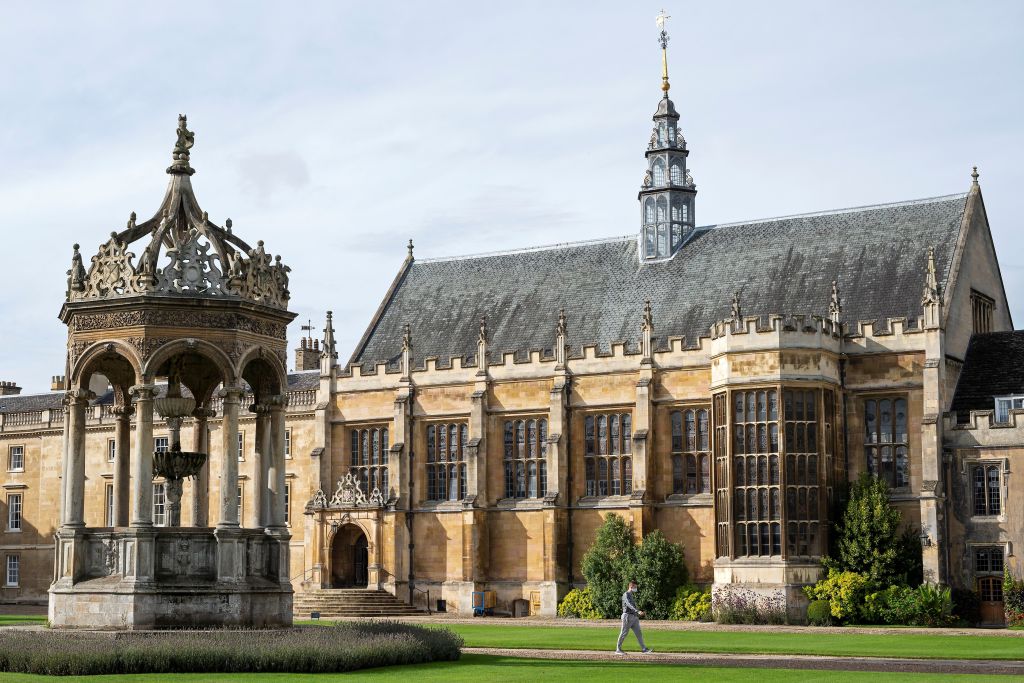News that Cambridge University is to commission an art installation to adorn one of its ancient buildings rarely warrants holding the front page. But when higher education is in sway to the cult of decolonisation, we know this will be no ordinary sculpture. Forget beauty, skill or originality. This new installation is not a celebration of artistic excellence but a monument to identity politics. The artist will be black and the art must memorialise black Cambridge scholars or graduates.
The new work is one of a series of commitments announced by Cambridge University in response to the findings of its three year-long inquiry into how the institution benefited from slavery. The conclusions of the report will surprise no one: the university received ‘significant benefits from companies that participated in the slave trade’ as well as from ‘individual benefactors and from fees derived from the families of plantation owners’. The only remarkable thing is that it took the Legacies of Enslavement Advisory Group so long to reach this conclusion.
But what to do with this knowledge? Clearly, no one alive today owned plantations or brutally herded human beings out of Africa and across the Atlantic. Yet Stephen Toope, the vice chancellor who established the Advisory Group, and the academics who contributed to the inquiry, think something must be done. Compensation must be paid. Primarily, it seems, in the form of art installations.
The plan for reparations is about making public displays of guilt and virtue rather than bringing about meaningful social change
As well as erecting sculptures, Cambridge now plans to name new streets and buildings after black graduates and scholars as well as influential abolitionists. Truly, the ghosts of long dead slaves must be delighted.
Other measures set to be implemented include installing a plaque alongside the statue of Tobias Rustat. This 17th-century courtier has long been a source of embarrassment to Cambridge’s identitarian elite. Earlier this year it emerged that Rustat’s monument had been blurred out of a promotional video. Concern that potential recruits to Jesus College would be deterred by a glimpse of the memorial to a chum of the last King Charles was dispelled with the help of some crafty editing. After attempts to engage in real life photoshopping – and erase history by removing the statue altogether – were thwarted, Cambridge’s peddlars in shame will now ‘contextualise’ Rustat with a recitation of his alleged sins.
Rustat’s legacy is fiercely contested. But actual historical detail seems to mean little to the Legacies of Enslavement Advisory Group. They are, it seems, more concerned with appearing to act than giving ground to alternative viewpoints. To this end, the inquiry has decreed that it is time for the Benin bronzes to be returned to Nigeria. Long a source of dispute, Jesus College first returned a bronze cockerel to Nigeria’s National Commission for Museums and Monuments last year. But the rub is that Benin, which no longer exists in any meaningful sense, grew rich and commissioned the bronzes off the profits of slavery.
The debate around repatriating the Benin Bronzes reveals the moral complexities involved in compensating for past wrongdoings. Britain looted the Bronzes, but who should own them now? Pretending the answer is straightforward does no one, least of all an elite academic institution, any favours.
But there’s more. Cambridge University is also proposing a slavery research centre, a boost to existing academic links between the institution and scholars in the Caribbean and west Africa. There will be more postgraduate scholarships and bursaries for black British students and students from Africa and the Caribbean. But students fortunate enough to win a place at Cambridge are unlikely to be those most devastated by the historical legacy of slavery or today’s social class inequalities, whatever their skin colour. The danger is such scholarships further benefit the already privileged.
The focus on plaques, street names and art projects suggest the plan for reparations is about Cambridge making public displays of guilt and virtue rather than a serious attempt to bring about meaningful social change.
If the university’s progressives really want to help those struggling today, they should drop their obsession with identity. Scholars are well placed to help schools in deprived areas that are crying out for subject specialists or children in need of some extra tuition. If there is money to spare, the university could review the employment conditions of non-academic staff. Those who keep the lawns manicured and the dining rooms stocked may appreciate a pay rise. Above all, Cambridge should ditch the guilt and focus on what it does best: being a brilliant university. Investing in the scientists, historians and poets of tomorrow will benefit the whole of society.
Virtue signalling with art installations and street names will not change history and it will not improve the lives of people struggling today. It is simply a means for the already privileged to assuage their guilt. They need to get over themselves for all our sakes.







Comments